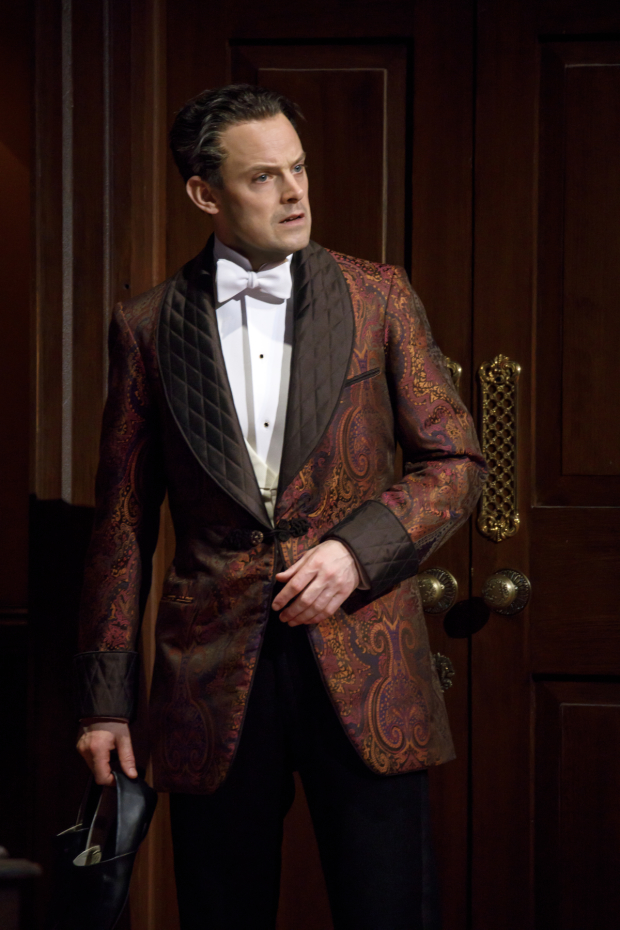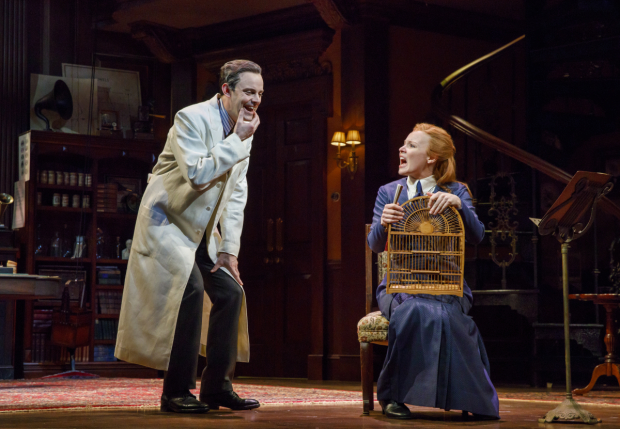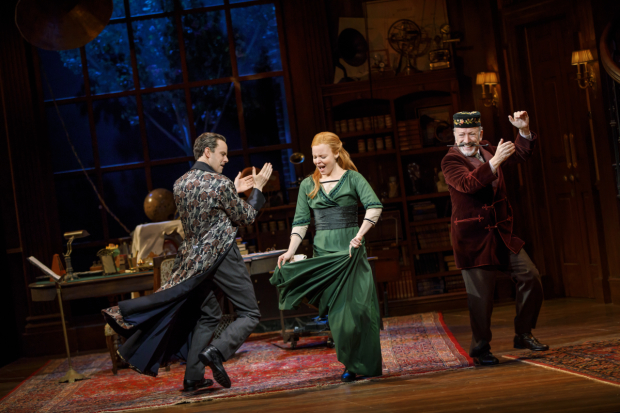Harry Hadden-Paton Finally Understands Why He Was Cast in My Fair Lady
When you think about My Fair Lady, the first thing that typically comes to mind is Eliza Doolittle's miraculous transformation from dirty "guttersnipe" to manicured socialite. With such a bright spotlight on her full-body makeover, it's easy to forget the metamorphosis that her callous phonetics teacher Henry Higgins simultaneously undergoes — and without the aid of a new wardrobe.
Harry Hadden-Paton is making an impressive Broadway debut as Lerner and Loewe's perfectionistic phonetician, and, as a relatively unknown figure on this side of the pond (save for his role as Bertie Pelham on PBS's Downton Abbey), he is gaining attention for his performance opposite the show's headlining star, Lauren Ambrose. As the Lincoln Center revival, directed by Tony winner Bartlett Sher, prepares for its official opening, we took a few minutes with Hadden-Paton to hear about the version of Higgins he's been carving for this My Fair Lady — an old classic with some new tricks.

(© Joan Marcus)
Congratulations on your Broadway debut! Was this something you sought out, or did you just get a call out of the blue asking if you wanted to audition for My Fair Lady?
That's exactly what happened. I was just twiddling my thumbs in London literally not knowing what I was going to do with my life and my agent says, "You got an audition for My Fair Lady with Bartlett Sher." And I said, "Why?" They usually cast it much older, so I said, "I know what's going to happen. I'm going to work really hard, I'm going to learn some songs, I'm going learn some scenes, and then they're going to give it to someone older and I will say, 'I told you so.' " She managed to talk me down and say, "No, just have a go and see what happens." That was really useful as a result because I went in not expecting anything.
What was the audition like?
I didn't even get through the first line of the first scene before Bart stopped me and said, "OK, now try it like this." I was in there for an hour, and it felt more like a rehearsal than an audition. And it set the scene for what's followed, which is the most collaborative process I've ever been involved in. Bart is amazing and has these incredible visions but is more than happy to listen to anybody else's view and opinion about how a scene works.

(© Joan Marcus)
What kind of work did the two of you do on your character? Henry Higgins is such a stubborn figure — how do you find the layers in there?
That was the tricky bit in the months before we started rehearsals. I was at home in London, so I did as much work as I could. I reminded myself how to do phonetics, and I looked into the people that Bernard Shaw had based the character on — one in particular, a phonetician called Henry Sweet. I bought all his books which are the most humorless boring guides to phonetics. I waded through it and what I found most useful was the introductions to these books written by the man himself. I studied them like a sort of critical analysis of a human being. What came out was a self-obsessed, passionate, single-minded guy. And then I read a quote of Bernard Shaw's. He was asked if Higgins was based on Henry Sweet, and he replied, "With Higgins's physique and temperament, Sweet might have set the Thames on fire." So I thought, OK, he's more energetic, more athletic, and fiery. That was a starting place. Then with Bart, we took the facts: We know he's not good at talking about emotions and understanding other people's emotions, so let's start with that. Maybe he's OCD, maybe he's got these other issues going on, and we played around with all sorts of things. What we're left with is layer upon layer upon layer of sense memory — all these different versions that create a human being.
How do you think Higgins changes between the beginning and end of My Fair Lady?
On reading it, I hadn't really appreciated the transformation he goes through. He's so set in his ways and will never let a woman into his life because they do this and he wants to be like this. What's clever is you see him slowly unravel as he realizes everything he believed is wrong. There is room for other things in his life, and that realization at the end that he can't really live without her is a huge moment. She changes him.
Without spoiling anything, the ending is staged in a very original way. How many iterations did that final scene go through before landing on this one?
[laughs] There were quite a few. There's a literal way of reading the last scene, which I never did, and I found it extraordinary that people would. People were worried when I say, "Where the devil are my slippers?" that I actually am ordering her to go and get my slippers. I think it's a callback to their friendship. It's their secret language. They're recalling things that they've said to each other in the past because they're unable to say the things that really matter. The play's tricky, but what we were keen on is that they are equals. Little did I know Bart was being quite clever by casting me as a younger Higgins because you don't get that awkward age difference. They are equals, and in the end, they leave as equals.

(© Joan Marcus)











